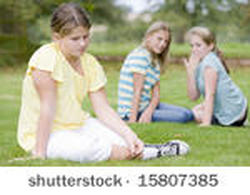 Seven year old Julie doesn’t run as fast as her best friend, Ava. She never wins a race, even though she tries really hard. Because she’s a bit pudgy, she is always picked last during recess when they choose up for kickball. Mom mentioned the weight concerns when she last took Julie for her annual checkup. The physician seemed to not make a big deal out of the extra weight, indicating that the scales show Julie to still be within the average range for her age. So, is there a problem here? Well, yes. If Julie is self-conscious about her weight and sees herself as losing out on stuff because of it, then that makes it a problem. As the parent, your go-to response is to active listen Julie’s feelings and concerns. It will be hard not to dismiss or diminish Julie’s feelings, because the physician did not have concern and she still is in the average range of weight. Really, really try to avoid judging, criticizing, and giving solutions. These are the three cautions to active listening. Most parents see it as their right and that their children actually want to be criticized, judged, and given solutions. This is what I call exercising your power at the expense of your relationship with your child. In our country, childhood obesity is a national epidemic. Obesity is clinically defined as carrying a weight which is at least 20% over the average range for your age and bone structure. Being “pudgy” is not necessarily being obese. Had Julie been obese, her pediatrician would have noted that. Throughout the total population of the US, 35% are overweight. After active listening Julie and noticing her emotional fever coming down, switch to problem-solving with her, giving her the lead. “Okay, sweetheart, I can see how really upset you are about your weight. Now that you are calmer, do you want to look at ways we can work together to help you lose that pudginess?” With Julie’s permission, begin listing options on a paper. Healthy-only snacks, family exercise time, affirmation post-it’s like, “I’m doing great!” “No more pudgy.” “Being me is okay.” Help her make her plan, and get her permission to help her stick to it. Weigh her after wakening and before breakfast every morning and have her chart her weight daily. Praise and brag on her with every pound she loses, no matter how long it takes. Now, with all this being said, keep in mind that Julie is still developing. Children tend to grow out before they grow up. Extra weight often precedes a growth spurt. So, help her be patient and not be so hard on herself. The human body is not fully formed for most people until they hit 18-25 years old. Is your child a little pudgy? Address her feelings before helping her tackle her weight concerns and you will find yourself in a teachable moment.
0 Comments
|
Archives
January 2024
Categories
All
|

 RSS Feed
RSS Feed
